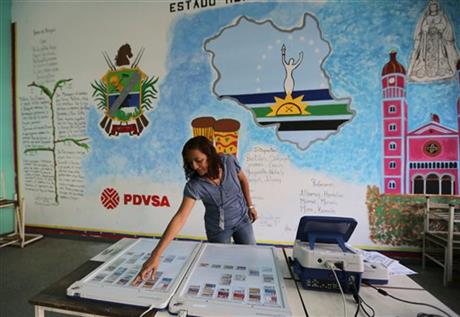
By JOSHUA GOODMAN
A member of the Venezuelan National Electoral Council tests a voting machine at a polling station in Caracas, Venezuela, Friday, Dec. 6, 2013. Venezuelans will vote in nationwide municipal elections Sunday. (AP Photo/Fernando Llano)
Antonio Ledezma
A man distributes campaign fliers promoting Caracas Metropolitan Mayor Antonio Ledezma, who is running for re-election, on a street in Caracas, Venezuela, Thursday, Dec. 5, 2013. Venezuelans will vote in nationwide municipal elections Sunday. (AP Photo/Ariana Cubillos)
Venezuela Opposition Media
In this Sunday, Dec. 1, 2013 photo, members of the media take photos and video of opposition leader Henrique Capriles during a municipal campaign rally in Caracas, Venezuela. As Capriles campaigned for president of Venezuela last April, he couldn’t venture more than a few steps without being hounded by dozens of sharp-elbowed cameramen and photographers. Nearly eight months later, the visibly thinner and exhausted opposition leader is accompanied by just a handful of journalists at what was supposed to be one of the final, electrifying opposition rallies ahead of this weekend’s mayoral elections. (AP Photo/Fernando Llano)
Prev 1 of 3 Next
CARACAS, Venezuela (AP) — President Nicolas Maduro faced his first electoral test since being elected nearly eight months ago, as Venezuelans went to the polls on Sunday to judge his government’s response to mounting economic troubles.
Maduro supporters roused voters before dawn with trucks blasting reveille, but early turnout seemed to be light, at least in the impoverished Petare neighborhood and some other districts of the capital.
The vote for mayors and city councils in this deeply polarized country was bound to be competitive. Maduro defeated opposition leader Henrique Capriles by a razor-thin margin in the election held in April to choose Hugo Chavez’s successor following his death from cancer.
Capriles has refused to recognize the results, alleging fraud
Since then, Venezuela’s economic troubles have deepened, with inflation touching a two-decade high of 54 percent, and shortages of everything from toilet paper to milk spreading while the black market value of the currency plunges.
Not surprisingly, disapproval of Maduro’s rule had been rising, especially within the coalition of ideological leftists and members of the military that he inherited from Chavez.
But the 51-year-old former bus driver has managed to regain momentum by going after groups and businesses he accuses of waging an economic war against his socialist government. Among the most popular measures: the seizure of dozens of retailers and the slashing of prices on plasma TVs, fridges and other appliances.
Local pollster Luis Vicente Leon says the offensive has helped boost president’s approval rating to just over 50 percent, about the same level of support he garnered in the April election, from 41 percent in September.
Unlike the opposition, which claims it’s the target of a campaign by Maduro to intimidate media that provide airtime to its events, pro-government candidates have also been helped by abundant coverage of almost-daily appearances by the president.
Maduro has also decreed Sunday a national holiday of “loyalty and love” for Chavez, whose legacy remains strong among poor Venezuelans.
The opposition is seeking to pick up votes in major cities — it currently holds just three of the top 10 most-populated districts, including the capital Caracas — and score a symbolic victory by taking the majority of the national total. In the last municipal elections in 2008, it won 46 municipalities, with another 10 going to dissident factions of Chavismo.
Pro-government candidates govern in the remaining of the 337 districts up for grabs on Sunday, many of them rural areas, and are hoping to thwart the opposition’s gains by taking control of Maracaibo, the country’s second-biggest city.
Barring an unlikely landslide for either side, the nation’s political stalemate is likely to continue, raising doubts about whether Maduro will double-down on his current course of price controls and heavy state intervention in the economy or adopt a more pragmatic course as moderate insiders had been advocating at the start of his government.
“These elections lost a lot of their relevancy in recent weeks,” says Dimitris Pantoulas, a Caracas-based political analyst. “Right now it’s the economic and social situation that will determine the direction of policy.”
___
AP Writers Jorge Rueda and Fabiola Sanchez contributed reporting
___



